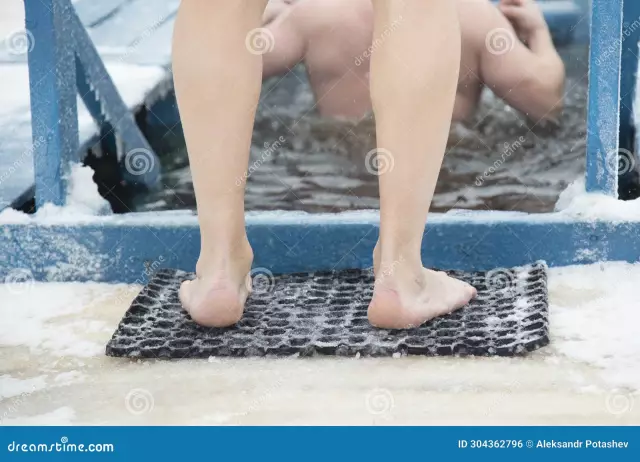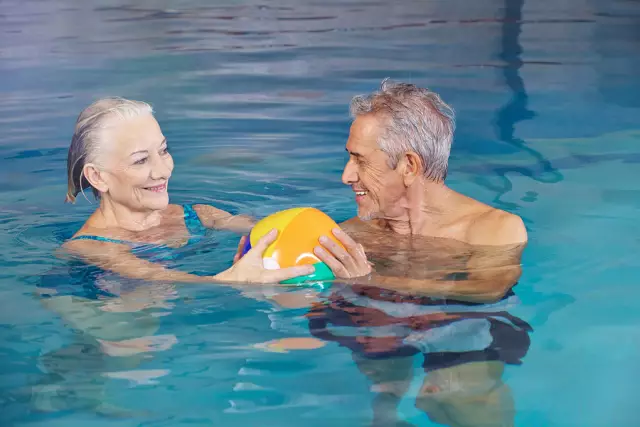- Author Rachel Wainwright wainwright@abchealthonline.com.
- Public 2023-12-15 07:39.
- Last modified 2025-11-02 20:14.
10 myths about hardening the body by winter swimming
Winter swimming in open waters, called winter swimming in our country, is an officially recognized sport and one of the most extreme ways of hardening the body. This method has a long history and adherents in many countries. International open water swimming competitions are held annually, and the world championship is held every two years. Despite its immense popularity and proven health benefits, winter swimming is still surrounded by persistent misconceptions. We will try to dispel the most common of them in this article.

Source: depositphotos.com
While swimming at the "walrus" the temperature of the internal organs rises sharply
When immersed in cold water, the body loses heat; the bathers do not experience any feeling of internal heat. This, however, does not mean that the "walrus" is cold to swim. On the contrary, during winter swimming, a person immerses himself in water, which is significantly warmer than frosty air (in an ice hole, water has a temperature of 0 to +4 ° C). The procedure provokes a strong release of adrenaline and glucose into the blood, helps to mobilize the body's hidden reserves, but no overheating of the internal organs occurs.
Winter swimming is only allowed
This is not true. Winter swimming requires a cold reservoir; in a significant part of the territory of our country, similar conditions persist from autumn to spring, or even all year round - in places where there are underground springs with ice water or mountain rivers flowing from glaciers.
Winter swimming is available to everyone without preparation
A dangerous delusion that can lead to the most sad consequences. First, winter swimming has a number of medical contraindications. Among them are chronic pathologies of the cardiovascular system and respiratory system, gynecological problems, kidney and urinary tract damage, severe hypertension, some types of allergies. Secondly, even a relatively healthy person should not jump into the ice hole without preparation. The body must be accustomed to low temperatures gradually. It is usually recommended to start with dousing with cold water, immersion in a bathtub or indoor pool, snow rubdown. The first swim in open water should not last more than a few seconds, with the obligatory subsequent transition to a warm room, rubbing the body and changing into dry clothes. With the right approach to hardening, bathing is carried out regularly,with a gradual increase in the duration of procedures and strict control of health.
Colds can be cured with ice swimming
Contrary to popular belief, "walruses" sometimes catch colds, although much less often than people who do not harden. However, immersion in cold water when you feel unwell (with fever or catarrhal symptoms) is unacceptable. Winter swimming is not a therapeutic procedure, it is only a method of preventing colds and strengthening the immune system.
"Walruses" get addicted to cold water
There is some truth in this statement: people who regularly practice winter swimming get used to the procedures and feel some discomfort when they have to give up diving. This state is very similar to the constant craving for dangerous activities in extreme athletes. Indeed, it turns out something like an addiction, but not on cold water, but on hormonal surges that occur during bathing. If a person ceases to control such sensations and begins to carry out procedures too often, he can harm his health.
Experienced "walruses" say that swimming twice a week is the best option.
All "walruses" are overweight
But this is completely wrong. Winter swimming has a beneficial effect on metabolism and helps to normalize body weight. It has been proven that overweight "walruses" gradually lose weight as a result of regular exercise, while those who are too thin gain the missing weight.
Plunging into a hole with your head is deadly
When immersed in cold water, a sharp vasospasm occurs, which can provoke loss of consciousness. Therefore, it is really undesirable to plunge headlong. Experienced “walruses”, whose bodies are already accustomed to temperature extremes, rarely do this, depending on the degree of hardening. It is better for a beginner to swim in a rubber cap and not lower his head in the water. For the same reason, it is not recommended to dive alone: there must be people nearby who can provide assistance in an emergency.
"Walruses" take alcohol before and after swimming
Drinking alcohol before diving is strictly prohibited. Its effect on blood vessels can be combined with the effects of cold, and the consequences are unpredictable. In addition, a drunk person loses the ability to objectively assess the surrounding reality and begins to behave too self-confident. Diving in this state is fraught with hypothermia and even death.
As for libation after bathing, people who are seriously involved in winter swimming claim that alcohol does not help to keep warm. In contrast, taking any cold drinks after a dive can lead to hypothermia. But after getting out of the water and changing clothes, it is useful to drink a glass of sweet warm tea in order to replace the energy spent by the body.

Source: depositphotos.com
Winter swimming develops muscles
The statement has nothing to do with reality. Strength and movement exercises are essential for building muscle and developing muscle. Short-term immersion in cold water and winter swimming do not give such loads.
Winter swimming is practiced only in Russia
Despite the fact that winter swimming in our country has very long roots, winter swimming is not an exclusively Russian invention. Clubs that unite supporters of this hardening method exist in most European countries (the most famous are Finland, Belgium and Poland), the USA, Canada and China.
Winter swimming in open water is a wonderful way to strengthen the body's defenses, to activate the work of all systems and organs. With a competent approach, it helps to avoid many health problems, preserve youth for a long time, physical and mental activity, interest in life.
YouTube video related to the article:

Maria Kulkes Medical journalist About the author
Education: First Moscow State Medical University named after I. M. Sechenov, specialty "General Medicine".
Found a mistake in the text? Select it and press Ctrl + Enter.






